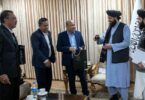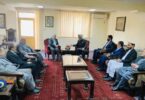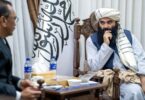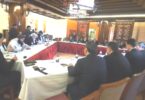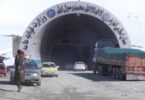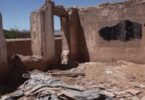KABUL (TOLO News): Nicholas Kay, the outgoing NATO Senior Civilian Representative in Afghanistan, has called for unity in the country to resolve the political deadlock and to proceed with the peace process in order to focus efforts on the coronavirus outbreak in the country.
The political impasse resulted from the announcement of the election results that declared Ashraf Ghani the winner. Ghani’s political opponent Abdullah Abdullah, disputing the results, also held an inauguration. Teams from the two sides have held many meetings but their tensions have remained unsolved.
In an interview with TOLOnews this week, Kay said: “Each crisis can only be resolve by compromise and by establishing in the end an inclusive governance arrangement, something that reflects the important diversity of the country. And I know that is the wish of both leaders and its just now a question of reaching an agreement on the details.”
Kay said that the recent statement issued by NATO is important and that “there is a strong international course across all dividing lines saying now is the time for the Afghan leaders to resolve the political deadlock and proceed with the peace process, and now is the time for the Taliban absolutely to cease their violence and allow the Afghan country to tackle the coronavirus challenge.”
The envoy said that the Afghan leaders have not made enough efforts to end the dispute.
“I am not going to portion any blame. These are difficult issues, and everybody is I think trying to do their best to bridge the differences and to come to a conclusion. But the conclusion is urgent,” he said. “They really do need to listen to their international friends and partners… Now is the time to unite the country, deal with the peace process and tackle the coronavirus,” he said.
On the peace process, Kay said that “the next step is for the Afghans to meet with the Taliban in the intra-Afghan negotiation and resolve this conflict that has now damaged– almost destroyed–the country for twenty years.”
“The Taliban as well need to come to the table,” he said. “NATO’s part is we have agreed to reduce our troops–that was part of the agreement on the 29th of February between the US and the Taliban and to build the confidence in the first phase, NATO is reducing its troops here in Afghanistan from 16,000 to about 12,000.”
On the high casualties among Afghan forces, Kay said “it is sad, it’s tragic and it is extremely wrong that the Taliban now, after their agreement with the United States, are continuing to attack Afghan national security forces and Afghan civilians.”
“They (the Taliban) are killing Afghan men, women and sometimes children across the country and how can that be a signal from the Taliban that they want peace and that they are serious about the peace process?” he said.
“NATO has made very clear that we condemn this violence. We call upon the Taliban to reduce it and now we are not calling to reduce it, we are calling for a ceasefire because the country has a health crisis, a pandemic that could kill many, many Afghans,” he added.
The British diplomat said that NATO continues its train, advice and assist mission.
“Our job here is to support the Afghan National Defense and Security Forces and we are doing that, and the Afghan national defense and security forces are now stronger and more professional than they have been before and our partnership with them remains,” he added.
Meanwhile, the Presidential Palace says the government leadership wants a quick end to the current challenges in the country.
“There has been some progress. The peace process in the country, the fight against the coronavirus, and finding a political solution to the current challenges are the top priorities of the president of Afghanistan and the leadership of the Afghan government,” presidential spokesman Sediq Sediqqi said.
Sources familiar with talks between Ghani and Abdullah’s teams said that the two sides will reach an agreement by the end of this week.
But the head of the Jamiat-e-Islami and former foreign minister Salahuddin Rabbani in a statement about the historic victory of the mujahideen said that he will not fall short in what he calls a coup in the last elections and that he will continue his fight against a change in the government system and share of power.
“In our fight we are not seeking privileges or a mission, but our goal has been to form a government in which people are involved in decision making directly and indirectly,” he said.
“We should prefer national interests rather than personal, group or party interests,” said Daud Kalakani, a close aide to former mujahideen leader Abdul Rab Rasul Sayyaf.

